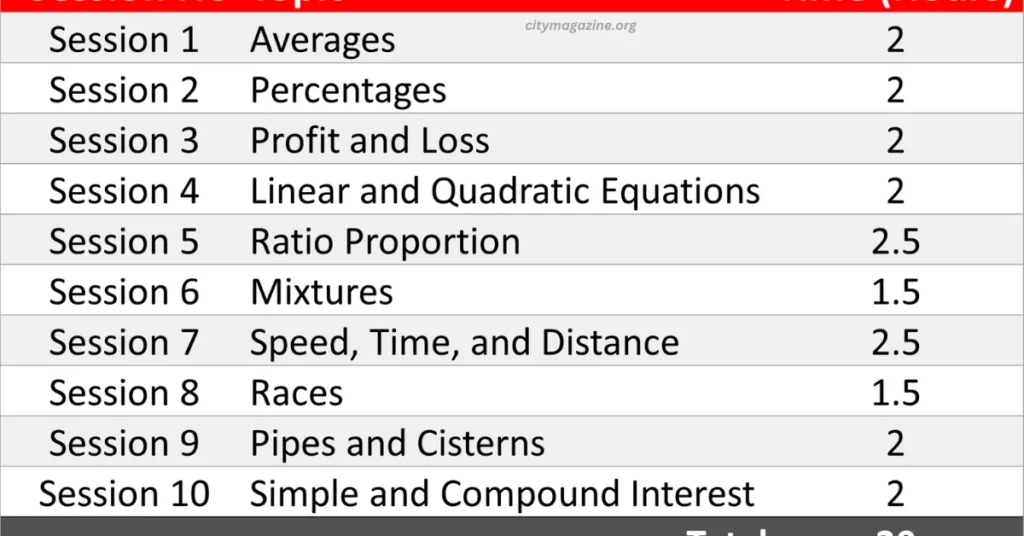The Quantitative Aptitude accounts for the majority of preparation for the CAT exam. With an extensive syllabus, the QA section tests the basics of the candidate. A solid understanding of the fundamentals is required to answer questions in these areas. This is the section with the highest number of topics. The QA section includes basic mathematics questions, such as arithmetic and geometry. It also includes questions about graphs, probability, and set theory.
Preparing for the quant section of the CAT exam necessitates a correct plan, and a well-set process will assist you in systematically preparing for each topic. The correct way to prepare is to grasp each quant topic’s fundamentals and advance to benchmark CAT problems. Learning the fundamentals is essential, as is the appropriate amount of practice. Because the CAT is a lengthy test that demands an automatic solution method to accommodate the time constraint, it is critical to practice with a range of questions to grasp the topic before going to the CAT level. Learn about the test and its preparation plan by visiting BYJU’s Exam Prep portal.
Quantitative Aptitude For CAT
Here are some essential topics from the quantitative aptitude section of CAT:
Arithmetic
Arithmetic is essential to the quant section and serves as a jump-starter. The majority of Arithmetic is used to supplement the Data Interpretation preparation. Profit, loss, speed, and time are some of the arithmetic topics covered in the CAT syllabus.
Number Systems
Number Systems is a broad topic that comprises around 1-3 problems in the CAT exam. Systems cover many concepts, including Factors and Multiples, HCF and LCM, Factorials, Base Systems, Remainders, and Miscellaneous. In theory, one must learn the fundamentals, such as factors and multiples, with no particular problem-solving approaches, hints, or shortcuts necessary.
Geometry
Geometry constitutes a significant portion of the CAT syllabus, accounting for 6-8 questions. It is a vast subject in which the fundamentals impact the entire learning process, and understanding concepts from theorems is the most excellent approach to analyzing how shapes function. Visualization and self-questioning when demonstrating various proofs aid in understanding many Geometry ideas. Knowing which theorem to use for each topic is essential for answering Geometry questions on the CAT test.
Algebra
After Arithmetic, algebra is the second most important topic for the CAT exam. Preparing for CAT Algebra necessitates becoming comfortable with variables and finding their value. The subjects covered in CAT Algebra cover are linear and quadratic equations, algebraic expressions, and polynomials.
Preparation For the CAT Quantitative Aptitude section
- Practice topic-wise, answering around 20 difficult problems ranging from easy to intermediate. All chapters need you to master the essential ideas and variations.
- Try solving some questions and basic calculations without using a pen. Use mental maths.
- Speed training and energy strengthening to complete this test in 120 minutes.
- You must devote 3-4 hours every day only to Quant.
- Attempt as many mock tests and previous years’ CAT papers as possible.
- Avoid using a calculator and instead rely on your mental abilities to interpret arithmetic concepts such as basic summation, multiplication, subtraction, and decimals. With time, you’ll notice how computations have been simplified for you, and the solutions are at your fingertips.
- Plan y
- our day according to a strict schedule. Begin with the fundamentals, and then put what you’ve learned into practice. Create a weekly schedule and then move on to a daily approach.
- Begin with the fundamentals and work your way up to more advanced ideas. Eventually, you’ll be able to work on Shortcut Techniques.
- Concentrate on your weak points and practice with sectional time.
It is often good to divide your CAT preparation period into three or four phases, beginning with learning vital topics and ending with regular intensive preparation through mock tests. A well-thought-out strategy guarantees that you are adequately prepared for the test. You will continually improve your CAT score if you meticulously follow a preparation strategy and keep a rigorous study regimen.
click here




